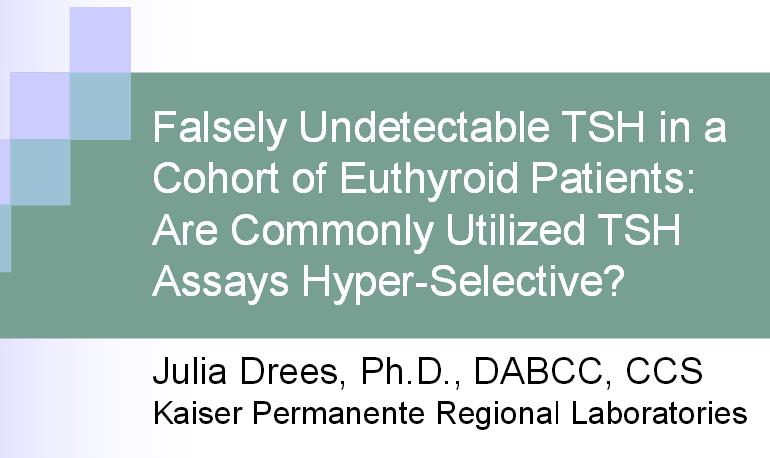I suspect the date is wrong - surprised if it shouldn't be 2014!
The scale of the issue here - 20 patients in 1.6 million - is small. But if you happen to be one of those 20, this could be 24 carat information!
J Clin Endocrinol Metab. 2013 Jan 1:jc20132092. [Epub ahead of print]
Falsely Undetectable TSH in a Cohort of South Asian Euthyroid Patients.
Drees JC, Stone JA, Reamer CR, Arboleda VE, Huang K, Hrynkow J, Greene DN, Petrie MS, Hoke C, Lorey TS, Dlott RS.
Author information
Kaiser Permanente, TPMG Regional Laboratory, Berkeley, CA.
Abstract
Context: An index case of a clinically euthyroid woman of South Asian descent was identified with discordant TSH results: undetectable TSH on our routine assay and normal TSH on an alternate assay. Low TSH concentrations due to functionally compromising TSH mutations have been reported. Here we describe a new phenomenon of functional TSH which is undetectable by four widely-used FDA-approved TSH immunoassays marketed by a single vendor. Objective: To identify additional cases and investigate the cause of the falsely undetectable TSH. Design: All samples with TSH results <0.01 μIU/mL were retested with a second TSH assay. Discordant samples were evaluated on up to eight FDA-approved TSH immunoassays and the TSH-beta gene was sequenced. Retrospectively, thyroid function tests, diagnoses and medications from 1.6 million individuals were analyzed. Results: Out of approximately two million individuals, we have identified a cohort of 20 hypothyroid and euthyroid patients of shared ethnicity with falsely undetectable TSH (<0.01 μIU/mL) in four of eight commercially available TSH assays. Half of these individuals were initially treated based on repeated falsely undetectable TSH values (seven euthyroid patients were treated with methimazole; two hypothyroid patients had doses of levothyroxine decreased). In all cases, retrospective chart review revealed that clinical assessments, free T4, and total T3 results were inconsistent with the undetectable TSH results. Specific antibodies failing to detect TSH in these cases were identified in the four affected assays. A novel TSH-beta point mutation was identified. Conclusions: Our data suggest these individuals have a previously unrecognized, functionally normal, TSH variant to which some monoclonal antibodies fail to bind. To assure appropriate patient management, clinicians and laboratorians need to be aware that certain TSH variants may be undetectable in some hyper-selective TSH assays.
PMID:
24423284
ncbi.nlm.nih.gov/pubmed/244...
Trying to find an online full version, I found this interesting pdf by the lead author:
aacc.org/members/loc_sectio...
In fact, although I have only spent seconds whizzing through, it might be very interesting!
UPDATE:
It is extremely well worth reading. I have long suspected that anyone with discordant test results (e.g. where TSH and FT4 don't reflect each other) would be looked at very much more carefully. This paper and, even more, the PDF make it abundantly clear that the authors agree.
Rod

 x
x